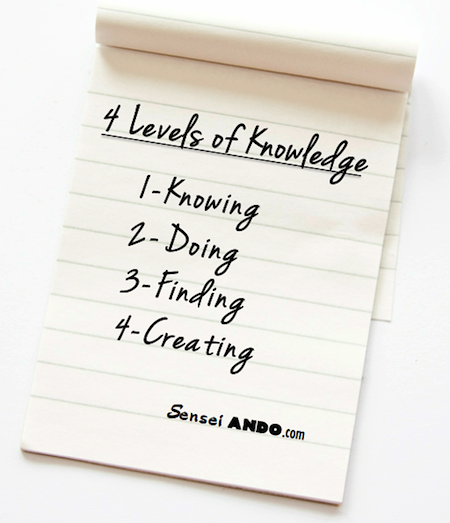They say knowledge is power. But they’re wrong. If knowledge was power, then—
Anyone who reads a book about Karate would be a master. Anyone who watches a video about Tae Kwon Do would be a world champion. Anyone who shows Grandma how to do an arm bar could be tapped out after Sunday dinner.
No. Knowledge is not enough. Just because you know something doesn’t mean you know something.
But people think they do. Ridiculous people.
- Students who whine: “I already know this. Show me something new.”
- Students who arrive late to class to skip the “basics”.
- Students (or instructors!) who teach a technique they just learned.
- Parents who complain how their child should be ranked higher because they’ve “mastered” everything.
Ridiculous. Ridiculous. Ridiculous.
Sure, knowledge feels powerful, but it does not, on its own, bestow competence or authority. Knowledge is the beginning of the learning process, not the end.
It takes time to transform information into mastery. In my experience, there are at least four levels of knowledge in the martial arts:

Let’s take a quick look at each…
1) KNOWING A TECHNIQUE. You read a book. You see a video. You attend a class.
Congratulations! You know a technique. You can explain it. You might even be able to demonstrate it. But you’re not very good at it. You can’t make it work consistently.
This is a dangerous stage because knowing a technique can be worse than not knowing a technique at all. You think you can do something when you can’t. You have a false sense of confidence. You put yourself at unnecessary risk.
2) DOING A TECHNIQUE. You practice. You drill. You try the technique different ways, on different partners, in different situations.
Congratulations! You can now do a technique. You can make it work consistently. You grooved it into your muscle memory. Your technical skill is impressive.
But wait! This is a dangerous stage, too, because you’re only able to make your technique work when you have time to think and adjust. But life is rarely so accommodating. You soon discover that being physically coordinated is not the same as being psychologically and emotionally coordinated.
3) FINDING A TECHNIQUE. You can do a technique under pressure. You recognize opportunities and execute without thinking. The technique falls into your hands and you take advantage of it.
Congratulations! You can now find a technique when you need it most. You are under attack and your technique appears to you. You are calm in the midst of chaos. You trust yourself to do the right thing.
But wait! This is a dangerous stage, too, because you react to opportunity, you do not create it. You wait for the technique to find you. You are limited to working with what you’re given–if you’re given anything at all. You do well when the other guy makes mistakes, but against people with more experience, your technique does not fall into your hands so easily.
4) CREATING A TECHNIQUE. You choose the technique and the method of achieving it. You lay traps. You shape circumstances and force the other guy into making choices that serve you. You set up what you want and you get it.
Congratulations! You have reached the highest level of knowledge. You know how to create opportunity. You know how to establish order for yourself and chaos for the other guy. This is mastery.
Actually, this goes beyond mastery.
When one thinks of a god, one thinks of the power of creation. But how does one create?
Desire is not enough. You must also know how to bring what you desire to life. But knowledge is not enough. You must also put your knowledge into action until experience and wisdom make your desire a reality.
When you create what you want, despite the whole world trying to stop you, you are a god.
So, if knowledge is power, let experience be your superpower. Practice, practice, and practice some more. Practice until you share in the godly power of creation.
Just don’t be ridiculous. Stop talking about what you know and start showing what you can do.

Hi Sensei Ando! Your philosophy degree is ever-present in your writing. Always great ideas to reflect upon!
Thank you! I’m glad that degree is good for SOMETHING! 🙂
Isn’t this like Tell me and I forget
Show mw and I remember
Involve me and I understand
Nope! But thanks anyway! 😉
Well put, sir. I know exactly what you are talking about. I usually do what you’re saying. Most of the time I find it but my full understanding won’t arrive until I create what you are talking about. Then again, it’s already been created. I cannot create something that has already been created so I guess I will forever be honing my knowledge and understanding. And thus the philopshy REALLY begins! Thanks for keeping me on my toes
Yes, sir! The last level is the most challenging. But it’s worth fighting for! Thanks for commenting!